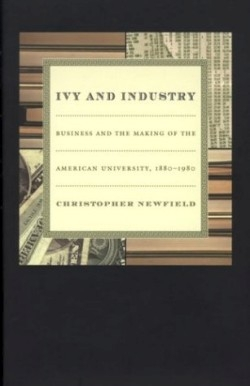Ivy and Industry
Business and the Making of the American University, 1880-1980
In this absorbing historical account of the intertwining of business influences on the American research universities during the last hundred years, the author draws on research and his experience as a professor of English at the University of California at Santa Barbara. His observations are insightful and support his opinion that humanism and management are in conflict and that “the future will be good only if we can figure out how to achieve free agency for an entire society within the complex organizations through which we do our work.”
The first part of the book describes the “two missions” of the research university: fostering intellectual development and promoting economic growth. Newfield explores how commercialization affected the university’s intellectual independence by an increased focus on profit, production, measurement, and management. He describes corporate styles of management as being “hard on academics” and “profoundly anti-humanist.”
Part two explains how the research university helped develop the American middle class and how managerial influences impacted the university’s main projects of human and economic development. One concern was that the post-World War II university was becoming increasingly bureaucratic and dependent on external sponsors, and that new management constraints may have restricted innovative research rather than encouraging it. Some believed that the new university-trained middle class was becoming conflicted between self-development and purely economic pursuits.
The next section of the book discusses the effects of “managerial humanism” on the business, scientific, and humanistic features of the university. For example, a split developed within the professional middle class between technological and nontechnological professionals in the workforce. The economic slump of the 1970s resulted in an increased focus on research into developing new technologies for creating new markets, and the universities relied on additional funding from industry.
The book quotes numerous sources from all positions on humanism and the corporatization of higher education, including William Rainey Harper, Benjamin Ide Wheeler, John Dewey, and Tom Peters. It is a great reference for the economic, political, and industrial influences on higher education throughout American history. While written from an academic’s perspective, it presents various viewpoints along with the historical chronicle.
Although Newfield’s personal point of view is clear, his approach strives to be more objective than cynical.
“Management,” he writes, “is neither good nor bad: it depends on whether it reflects the agency of its members.”
Reviewed by
Cindy Kryszak
Disclosure: This article is not an endorsement, but a review. The publisher of this book provided free copies of the book to have their book reviewed by a professional reviewer. No fee was paid by the publisher for this review. Foreword Reviews only recommends books that we love. Foreword Magazine, Inc. is disclosing this in accordance with the Federal Trade Commission’s 16 CFR, Part 255.

